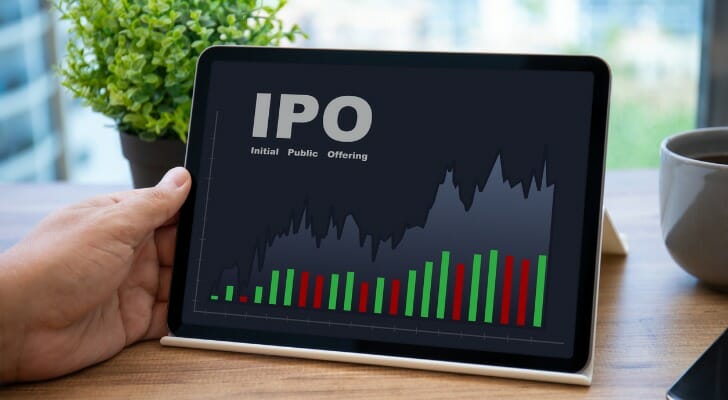An initial public offering, or IPO, occurs when a company first offers shares of its stock for sale to the general public. In most, if not all, cases retail investors cannot buy IPO stock. They can legally do so, but typically don’t have access to stock in its initial offering. Companies sell these shares to banks, funds and other institutional investors. Those investors, in turn, resell stock on the open market. Determining if it’s a good investment is completely up to your individual portfolio and long-term goals. You may want to work with a financial advisor to help you determine if it’s a good fit.
What Is an IPO?
An initial public offering (IPO), refers to the process of turning a privately owned company into a publicly owned company. A privately owned company is one owned by a relatively small group of people, typically some combination of its founders and early investors. Such entities face a relatively light regulatory oversight.
A publicly owned company is one that issues shares of stock that can be purchased by the public at large. Anyone who can legally buy and sell a stock can trade shares on a major exchange in a public company and to protect the public large companies have to comply with significant disclosure and oversight laws.
Almost all equity investments occur on the secondary market when shareholders buy and sell stocks on public exchanges. During an IPO, investors can buy stocks on what’s called the primary market by purchasing shares directly from the issuer.
How Can You Buy IPO Stock?

While individual investors can legally buy shares of IPO stock, they rarely get the opportunity to do so. Retail investors typically need to buy IPO stock from the investment bank that manages the IPO by ordering shares directly from this bank. It’s very rare for individuals to get this kind of access. Investment banks almost always sell these shares to institutional investors. It’s easier to sell thousands of shares to a single investor than to find thousands of individual buyers.
For an individual, buying into an IPO almost always requires some sort of connection to the process. You may need a contact at the company going public or a stock broker connected to an investment bank managing the sale. Otherwise, you have to wait until those initial investors resell their shares on the general market. That said, there are a few ways you can improve your chances of building those connections, including:
1. Work for a Startup
When individuals do get to buy IPO stock, it’s almost always because they are connected to the company in some fashion. For example, they may be friends or family with the founders. Or, more often, they work for the company.
Many startup companies give their employees some form of stock access when they go public. This helps compensate those employees for some of the risks involved with working for a new business. It also makes working for a startup one of the few reliable ways to access IPO stock, although it involves a major commitment in the process.
2. Invest in an IPO Fund
Some mutual funds and ETFs are built to invest in IPO stocks. As institutional investors, they can often get these shares during the initial phase rather than waiting to buy stock on the secondary market. These tend to be growth-oriented funds with a higher risk profile than typical funds, but that means they also offer greater potential rewards.
3. Invest With an IPO Broker
Occasionally you can find a broker that offers IPO share access. They tend to do this by acting as an individual investor on behalf of their clients. That is to say, the broker itself may purchase thousands of shares, qualifying it to buy the initial shares of stock and will then distribute those shares among individual investors that placed purchase orders.
These are not as common as you might think. TD Ameritrade is one of the few mainstream brokers offering IPO stock to its retail investors. And when you can find a broker like this, they tend to have very high capital requirements. That makes these a viable option for investors with relatively high net worth, but not a strong option for most retail investors.
The Bottom Line

When a company first releases its stock for the public to buy it’s called an “initial public offering.” While anyone is allowed to buy this stock, you need to have access to the company or the investment bank managing this sale. This is difficult, if possible, for individual investors to do.
Tips for Investing
- IPO stock can be a huge winner, but also a big risk. Is that kind of risky asset the right move for you? Well, it typically depends on your unique situation. You may want to enlist the help of a financial advisor to help you figure it all out. Finding a financial advisor doesn’t have to be hard. SmartAsset’s free tool matches you with up to three vetted financial advisors who serve your area, and you can interview your advisor matches at no cost to decide which one is right for you. If you’re ready to find an advisor who can help you achieve your financial goals, get started now.
- If you’ve found an IPO that you are particularly fond of, consider using SmartAsset’s free investment return calculator to help you determine the potential return your portfolio might get from the investment.
Photo credit: ©iStock.com/Prykhodov, ©iStock.com/PrathanChorruangsak, ©iStock.com/Kateryna Onyshchuk
